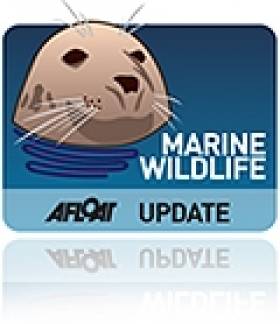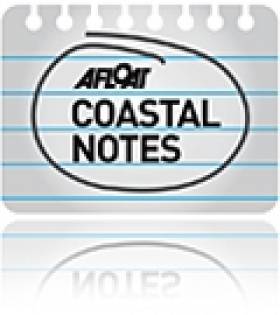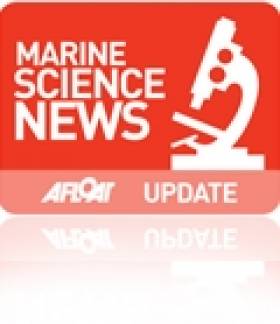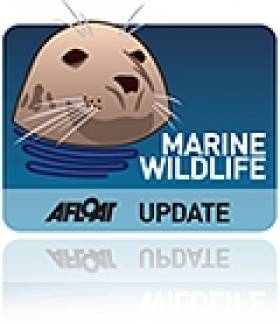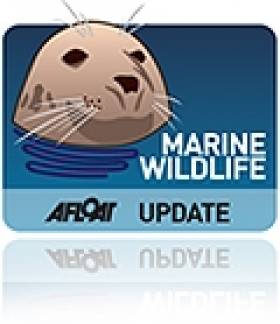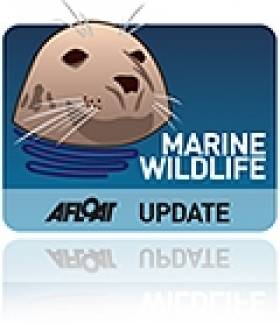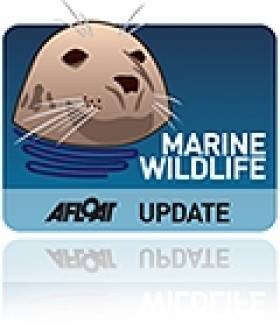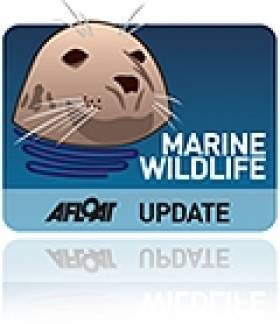Displaying items by tag: Whales
Student On the Seas for Whale and Dolphin Survey
A mature student from the Galway Mayo Institute of Technology is taking part in the Irish Whale and Dolphin Group's Ship Surveys Programme.
Irish Weather Online reports that Enda McKeogh is on board the Marine Institute's research vessel Celtic Explorer off the west coast of Scotland, where he has already made a number of sightings of whales and dolphins.
He said: "I expected to be sea sick most of the time and not to see many cetaceans but this has proven not to be the case so far."
McKeogh is recording is sightings in a diary on the IWDG website HERE.
A Day in the Life of a West Cork Whale Watcher
Today's Irish Times recounts a day in the life of whale watch operator Nic Slocum.
Originally from the UK, Slocum traded tiring commutes to London for the peaceful life of sailing in west Cork 10 years ago, and shortly after turned his hobby into a new business by running whale watching excursions.
"We don’t promise whales and dolphins every time because they are unpredictable creatures," says the Whale Watch West Cork proprietor, "but for anyone interested in wildlife, there is an abundance of things to see. The marine coast is spectacularly beautiful here."
The Irish Times has more on the story HERE.
Ferry Operator Assists in Marine-Life Conservation Role
Fastnet Line which runs the Cork-Swansea port route on the Celtic Sea, is assisting the charity MarineLife to monitor cetaceans, writes Jehan Ashmore.
The work of MarineLife is to survey the population trends and track the movements of dolphins, whales, porpoises and other wildlife. The research is undertaken onboard Fastnet Line's Julia (1981/21,699grt) and access to the ferry is provided free-of-charge to the wildlife-based charity.
During the months of July and August the ferry's schedule will allow for further opportunities to conduct daylight sightings of marine-life which is to be posted on MarineLife and Fastnet Line websites.
Adrian Shephard, Chairman of MarineLife Trustees, said: "The route from Swansea to Cork crosses a range of marine habitats and we hope it will generate many sightings of cetaceans and seabirds, including two important species we monitor, the white-beaked dolphin and the balearic shearwater".
In addition monitors recently observed fin whales, the second largest whale on the planet. Such sightings provide vital information and this will contribute to a better understanding of the distribution of cetaceans and other marine life in the Celtic Sea. To read more www.marine-life.org.uk
The first of four summertime surveys is to take place on 10 July. Overall the research by MarineLife is part of a larger project which also involves the use of other ferries operating in the Irish Sea and those serving on UK continental routes.
The 1,500 passenger / 325 car-carrying Julia sails year-round six times a week between September to June and from next month and during August the vessel will provide eight sailings per week. For fares and sailings schedules contact www.fastnetline.com
Fears for Pilot Whale Pod Headed for Ireland
The Irish Whale and Dolphin Group (IWDG) is on alert as a pod of pilot whales that narrowly avoided a mass stranding in Scotland heads south towards Ireland.
The situation has prompted fears of a repeat of last year's tragic beaching of 33 whales on an island off the Donegal coast.
Simon Berrow of the IWDG told The Guardian: "We're on standby to see if the pilot whales come to Ireland, and we're getting regular updates from our colleagues in the UK. So we're watching and waiting."
The Guardian has more on the story HERE.
Pilot Whales Avoid Mass Stranding in Scotland
Rescuers reports that a pod of around 60 pilot whales at risk of beaching in shallow waters off Scotland's Western Isles appear to be out of danger.
According to The Guardian, the whale pod alarmed conservationists by swmming into Loch Carnan in a remote part of South Uist last Thursday.
The whales have since moved into open water heading south, but Dave Jarvis of British Divers Marine Life Rescue said they were not yet in the clear, as the rocky coastline hosts a number of inlets and bays that could present dangers to the pod.
Some of the whales have injuries to their heads which are believed to be caused by striking the loch's jagged shoreline.
The Guardian has more on the story HERE.
Basking Sharks Top Recent Marine Sightings
Basking sharks have dominated recent sightings of large marine wildlife, according to the Irish Whale and Dolphin Group (IWDG).
The largest shark species in Irish waters accounted for a whopping 43% of sightings submitted to the IWDG's ISCOPE database between 22 April and 1 May.
Other marine species spotted include minke whales (14%), bottlenose dolphins (10%) and sperm whales (2.5%).
April's unseasonably warm weather and calmer seas brought more people out to the water, which may account for this rise in figures.
Ireland's Wildlife has more on the story HERE.
Fáilte Ireland in Whale Advert Gaffe
Fáilte Ireland has come under fire for an advert that shows a whale that cannot be found in Irish waters.
According to the Irish Examiner, the Irish Whale and Dolphin Group (IWDG) has questioned by images of humpback or fin whales, which are a common sight off Ireland's coast, were not used instead.
The IWDG'sSimon Berrow said: "It’s great that we are promoting marine tourism but if we are serious about it, let’s do it properly."
Last year Fáilte Ireland was criticised for a similar advertisement that used stock footage of a whale species not found in Ireland.
The Irish Examiner has more on the story HERE.
Vets Get to Grips With Whale, Dolphin Post-Mortems
The Irish Whale and Dolphin Group's (IWDG) recent workshop on the post-mortem examination of stranded dolphins and whales is hoped to encourage the building of much needed experience for Ireland's vets dealing with marine animals.
More than 20 veterinarians from across the country attended the workshop in Athlone, where they were shown how to carry out a post-mortem from a research perspective and taken through the post-mortem protocol, as well as the collection of samples for various parameters from bacteriology to genetics.
"The IWDG have long advocated that the post-mortem examination of stranded cetaceans should be carried out by veterinary pathologists to determine their cause of death and provide samples for life-history studies," said the group's Dr Simon Berrow.
Removal of Whales to Cost Council €10,000
The pod, which had been observed in waters between Arranmore Island and Burtonport during the week before they stranded themselves on a beach on Rutland, were also believed to be the same pod monitored off the South Uist, off the Hebrides. Shortly before that it was feared that the whales may have also attempted to beach themselves.
Dr Simon Berrow of the Irish Whale and Dolphin Group (IWDG) said he could not rule out sonar interference for confusing the whales and leading to their beach deaths. For information on the IWDG logon to www.iwdg.ie
Massive Increase in Whale and Dolphin Strandings
New figures to be released this week on marine animals point to a whopping 25% increase in whale and dolphin strandings in the UK and Ireland.
BBC News reports that data collected by the UK Cetacean Strandings Investigation Programme (CSIP) show reported strandings have risen by a quarter since records began 20 years ago.
The news comes just weeks after the shocking mass stranding of pilot whales in Co Donegal.
It's also reported that at least 500 dolphins, porpoises and whales have been found stranded on British beaches this year.
Commenting on the rising numbers, Ian Enlander of the Irish Whale and Dolphin Group (IWDG) told BBC News: "It may be a sign that awareness of strandings is increasing, or perhaps something else is going on."
The BBC News website has more on the story HERE.



























